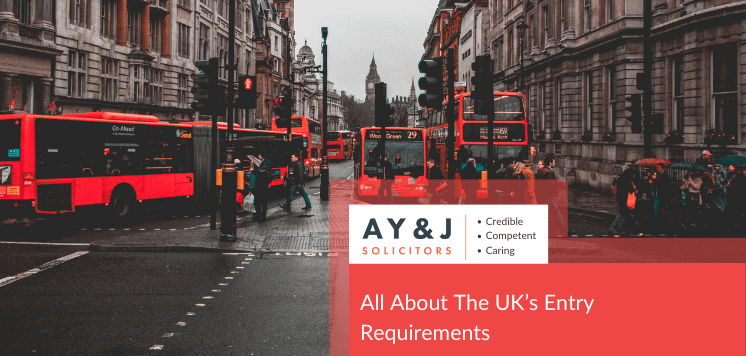Disclaimer: The information in this blog is accurate as of its publication date. Any updates after that date are not reflected here.
If you plan to come to the UK in 2023 or beyond, it is important to understand the United Kingdom entry requirements before you travel. By bringing the correct documentation with you, you can ensure that you are granted permission to enter the UK at one of our ports or airports. The exact UK entry requirements you need to meet will depend on why you are coming, where you have travelled from or through, and your nationality. In this article, we will explain all about the UK’s entry requirement rules.
Table of Contents
UK entry requirements for British nationals
As a British citizen, the UK entry requirements state that you will need to show your passport as evidence of your British citizenship when you arrive at the border.
If you are a British national living in Gibraltar, you can also show your Gibraltar identity card.
If you are a British citizen travelling from Ireland to England, Scotland, or Wales, you may be asked to prove your identity and nationality. You can do this by showing your passport (this can be current or expired), your UK citizenship certificate, your Gibraltar identity card (current or expired), or a copy of your passport showing your identity and nationality. What matters is that you can show both your identity and your nationality. If necessary, you can show your driving licence to prove your identity and your citizenship certificate to prove your British nationality.
UK entry requirements for EU, Switzerland, Norway, Iceland or Liechtenstein nationals
If you are from the EU, Switzerland, Norway, Iceland, or Liechtenstein, and you are interested in travelling to England, it is essential to be aware of the England entry requirements. You can enter the UK if you can show either your passport, Irish passport card, or national identity card.
Regarding the specific England entry requirement, if you plan to rely on your national identity card, it must have been issued by an EU country, Switzerland, Norway, Iceland, or Liechtenstein. Additionally, it is crucial that your national identity card remains valid for the entirety of your stay in the UK. The rules further specify that you can only use your EU, Switzerland, Norway, Iceland, or Liechtenstein national identity card if you meet these criteria:
- hold EU Settlement Scheme (EUSS) settled or pre-settled status, or Jersey, Guernsey or the Isle of Man’s settlement schemes
- hold an EU Settlement Scheme family permit (or the equivalent from Jersey, Guernsey or the Isle of Man)
- hold a Frontier Worker Permit
- are an S2 Healthcare Visitor, or
- are a Swiss national and have a Service Provider from Switzerland visa
The United Kingdom entry requirements also provide clarification for those who are waiting for a decision on their EUSS pre-settled or settled status application. In this case, they advise that you can still use your national identity card to gain entry at the UK border if you have confirmation that your application is valid and you are not applying as a joining family member.
If you do not currently hold EUSS pre-settled or settled status and you have not yet applied but intend to do so in the future, you will need either an EU Settlement Scheme family permit or a valid visa to gain entry to the UK.
UK entry requirements for those outside the EU, Switzerland, Norway, Iceland or Liechtenstein
If you are from outside of the EU or the EEA, you will need to show your passport. The Government website states that your passport must be valid for the full duration of your stay.
Depending on the reason why you are coming to the UK, you may need to secure a visa before you arrive. If you are planning to visit the UK for a short period of up to 6 months, you may require a visitor visa. If you are from one of the countries listed below (see Visitor visa exempt countries), you will not need a visitor visa.
As a visitor in the UK, you can stay for up to 6 months and:
- travel as a tourist
- visit your family or friends
- volunteer for up to 30 days with a registered charity
- transit to another country
- do some business activities, e.g. attend a meeting or interview
- take part in a school exchange programme
- do a recreational course of up to 30 days
- study
- partake in academic or scientific research and undertake clinical attachments
- receive private medical treatment
For longer trips to the UK, you may need a work (e.g. skilled worker visa), business (e.g. start-up visa), study, or family (e.g. spouse visa) visa.
To check if you need a visa of any type, you can take a look at the Home Office’s online “Check if you need a UK visa” service.
If you require a visa to come to the UK, your airline or transport provider may ask for evidence of your UK visa or a document showing that you have permission to enter. This can include biometric residence cards or EU Settlement Scheme family permits issued in the UK. It is important to check that your visa is valid before travelling to the UK and it will not expire prior to your arrival.
Visitor visa-exempt countries
You will not need a visitor visa if you plan to visit the UK for up to 6 months and are from one of the following countries:
|
|
| ||
|
|
| ||
|
|
| ||
|
|
| ||
|
|
| ||
|
|
| ||
|
|
| ||
|
|
| ||
|
|
| ||
|
|
| ||
|
|
| ||
|
|
| ||
|
|
| ||
|
|
| ||
|
|
| ||
|
|
| ||
|
|
| ||
|
|
| ||
|
|
| ||
| ||||
| ||||
Final words
Before you make your journey to the UK, it is essential that you have all of the documents and evidence you will need to show at the border to permit your entry into the country. Being prepared will ensure that you can proceed through border control without delay, allowing you to start or resume your stay in the UK with ease.
A Y & J Solicitors is a specialist immigration law firm with extensive experience with all types of visa applications. We have an in-depth understanding of immigration law and are professional and results-focused. For assistance with understanding and meeting your UK entry requirements, please contact us on +44 20 7404 7933 or by emailing contact@ayjsolicitors.com. We’re here to help!









